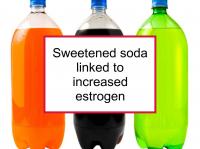Frequent consumption of added sugar, sugary sweets, and high-sugar desserts is associated with increased risk of breast cancer. This is true not only of women with metabolic syndrome or type 2 diabetes, but also of those who are not overweight and not insulin resistant. Fructose has been shown to induce more aggressive characteristics in triple negative (ER-/PR-/HER2-) breast cancer cells.
Now a new study has reported that sweetened soda consumption increases the level of circulating estrogen, a known risk factor for breast cancer.
Latest research links sweetened soda to estrogen levels
The study referenced at the beginning of this news story was designed to examine the associations between energy-containing beverages, added sugars, and total fructose intake and reproductive hormones in premenopausal women. The term energy-containing beverages refers to calorie-containing (as opposed to artificially sweetened), not "energy drinks" such as Red Bull. The authors were interested in the possible effects of sugar intake on fertility. The study included 259 women in the BioCycle Study who were followed for up to two menstrual cycles. Blood was drawn from study participants during up to eight visits per menstrual cycle. The women also provided four 24-hour dietary recalls per cycle.
Women who consumed at least one cup (237 mL) of sweetened soda per day were found to have 16.3% higher estradiol concentrations compared to women who consumed less sweetened soda after adjusting for age, body mass index (BMI), dietary factors, race, and level of physical activity. Estradiol, which is the most important estrogen, influences the development and maintenance of feminine characteristics by binding to estrogen receptors. Cola and non-cola sodas produced similarly elevated estradiol concentrations. On the other hand, artificially sweetened soda and fruit juice consumption were not significantly associated with reproductive hormones.
When diet was considered as a whole, added sugar above the average U.S. intake for women (73.2 g per day) or above the 66th percentile in total fructose intake (41.5 g per day) was associated with significantly elevated estradiol but not consistently across all models. No associations were found between beverages, added sugars, or total fructose intake and lack of ovulation. The authors conclude that even moderate consumption of sweetened soda is associated with elevated estradiol concentrations among premenopausal women. Further research into the mechanism underlying the association between energy-containing beverages and reproductive hormones is warranted.
